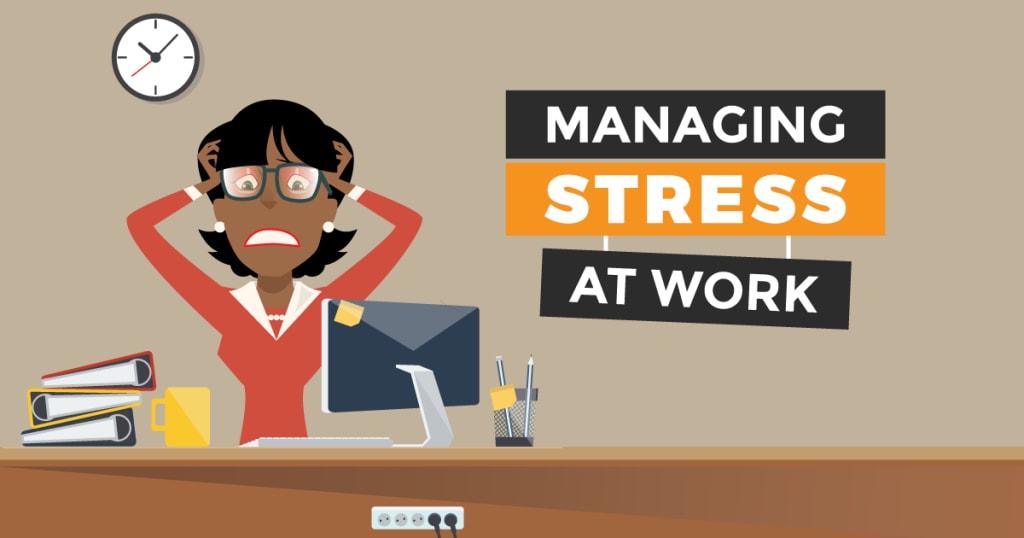How to Manage Stress in the Workplace
Stress is an unavoidable part of modern life, and for many of us, it's something that we experience on a regular basis. In the workplace, stress can be particularly challenging, as it can impact our performance, productivity, and overall well-being. Fortunately, there are steps that you can take to manage stress in the workplace and stay healthy, focused, and productive.

Understanding Stress
Before we can talk about managing stress, it's important to understand what stress is and how it affects us. Stress is a natural response to challenging situations, and it can be both positive and negative. Positive stress, also known as eustress, can help motivate us and improve our performance. Negative stress, or distress, can be harmful to our health and well-being.
The Causes of Workplace Stress
There are many different factors that can contribute to workplace stress, including job insecurity, long hours, heavy workloads, interpersonal conflicts, and poor management. These factors can all contribute to a sense of overwhelm and anxiety, which can lead to burnout if not addressed.
The Impact of Workplace Stress
Stress can have a profound impact on our health and well-being, both in the short and long-term. In the short term, stress can cause physical symptoms such as headaches, muscle tension, and digestive issues. It can also impact our mood and cognitive function, making it difficult to concentrate and perform at our best. Over the long term, stress can lead to more serious health problems such as cardiovascular disease, depression, and anxiety disorders.
Strategies for Managing Workplace Stress
Fortunately, there are steps that you can take to manage stress in the workplace and promote your overall well-being. Here are some strategies to consider:
1. Identify Your Triggers
The first step in managing stress is to identify your triggers. What are the situations or circumstances that tend to cause you the most stress? Once you've identified your triggers, you can start to develop strategies for managing them.
2. Practice Mindfulness
Mindfulness is a technique that involves paying attention to the present moment without judgment. It can be a powerful tool for managing stress, as it can help you stay focused and grounded even in challenging situations. Consider practicing mindfulness techniques such as deep breathing, meditation, or yoga.
3. Practice Self-Care
Self-care is an important part of managing stress, as it can help you stay healthy, energized, and focused. Make sure to prioritize activities that promote your physical and emotional well-being, such as exercise, healthy eating, and getting enough sleep.
4. Set Boundaries
Setting boundaries is an important part of managing workplace stress. This can involve setting limits on your work hours, delegating tasks, and learning to say no when you're feeling overwhelmed.
5. Build Strong Relationships
Building strong relationships with your colleagues can be an important part of managing workplace stress. Having a support system in place can help you feel more connected and supported, and can make it easier to cope with challenging situations.
Conclusion
Managing stress in the workplace is an ongoing process, and it's important to be proactive about your well-being. By understanding the causes and impacts of workplace stress, and by developingcontinuously, you can reduce the negative impact of stress on your health, productivity, and overall well-being. By practicing mindfulness, prioritizing self-care, setting boundaries, and building strong relationships with your colleagues, you can create a more positive and supportive work environment that fosters success and growth.
FAQs
What are some signs that you might be experiencing workplace stress?
Feeling overwhelmed or anxious
Trouble sleeping or concentrating
Physical symptoms such as headaches or muscle tension
Decreased productivity or job satisfaction
Mood swings or irritability
How can I talk to my employer about workplace stress?
Schedule a private meeting to discuss your concerns
Be specific about the factors contributing to your stress
Offer suggestions for how your employer can help address the issue
Emphasize the impact of workplace stress on your productivity and well-being
What role can exercise play in managing workplace stress?
Exercise can help reduce feelings of anxiety and depression
It can help improve your overall physical health, which can in turn reduce stress levels
Exercise can also help you feel more energized and focused, which can improve your productivity at work
How can I build stronger relationships with my colleagues?
Look for opportunities to collaborate on projects or tasks
Make time for social activities outside of work, such as lunch or after-work events
Practice active listening and empathy in your interactions with colleagues
Show appreciation for your colleagues' contributions and accomplishments
What are some additional resources for managing workplace stress?
Employee assistance programs (EAPs)
Stress management workshops or classes
Mindfulness or meditation apps
Counseling or therapy services
Online support groups or forums
About the Creator
ADITYA SALVE
My Name is Aditya Salve, and I am a beginner graphic designer with a growing interest in content writing. I have completed my training in Adobe Photoshop and After Effects, and I am currently learning 3ds Max to expand my skill






Comments
There are no comments for this story
Be the first to respond and start the conversation.